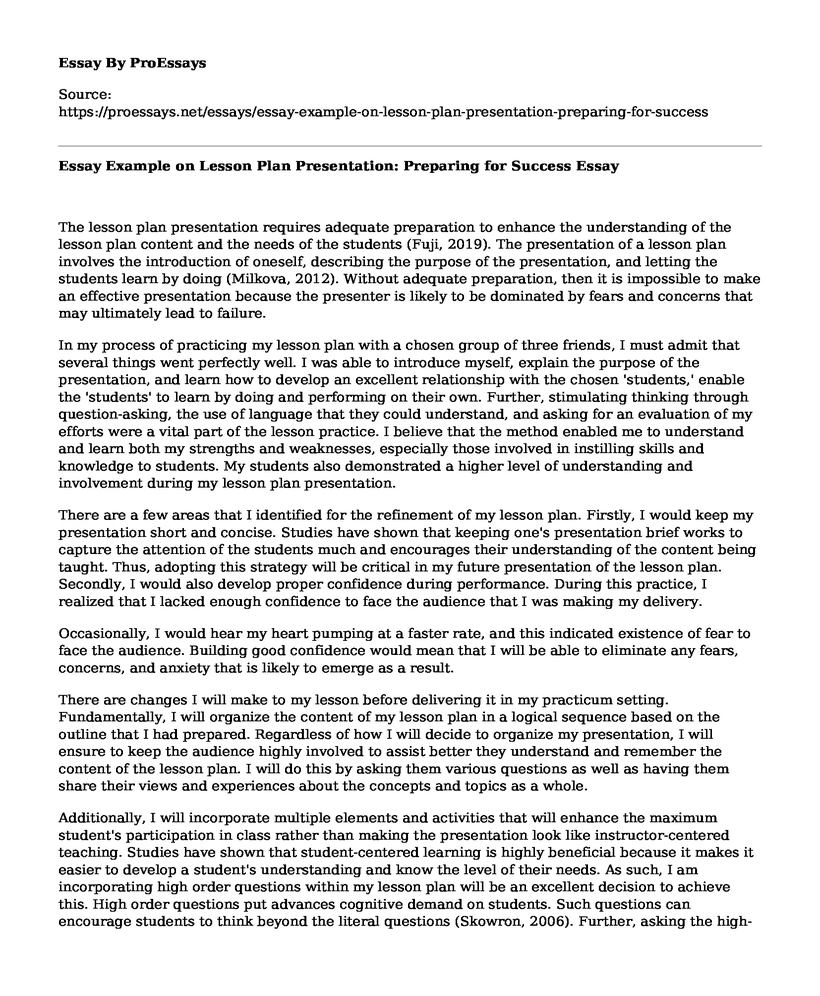The lesson plan presentation requires adequate preparation to enhance the understanding of the lesson plan content and the needs of the students (Fuji, 2019). The presentation of a lesson plan involves the introduction of oneself, describing the purpose of the presentation, and letting the students learn by doing (Milkova, 2012). Without adequate preparation, then it is impossible to make an effective presentation because the presenter is likely to be dominated by fears and concerns that may ultimately lead to failure.
In my process of practicing my lesson plan with a chosen group of three friends, I must admit that several things went perfectly well. I was able to introduce myself, explain the purpose of the presentation, and learn how to develop an excellent relationship with the chosen 'students,' enable the 'students' to learn by doing and performing on their own. Further, stimulating thinking through question-asking, the use of language that they could understand, and asking for an evaluation of my efforts were a vital part of the lesson practice. I believe that the method enabled me to understand and learn both my strengths and weaknesses, especially those involved in instilling skills and knowledge to students. My students also demonstrated a higher level of understanding and involvement during my lesson plan presentation.
There are a few areas that I identified for the refinement of my lesson plan. Firstly, I would keep my presentation short and concise. Studies have shown that keeping one's presentation brief works to capture the attention of the students much and encourages their understanding of the content being taught. Thus, adopting this strategy will be critical in my future presentation of the lesson plan. Secondly, I would also develop proper confidence during performance. During this practice, I realized that I lacked enough confidence to face the audience that I was making my delivery.
Occasionally, I would hear my heart pumping at a faster rate, and this indicated existence of fear to face the audience. Building good confidence would mean that I will be able to eliminate any fears, concerns, and anxiety that is likely to emerge as a result.
There are changes I will make to my lesson before delivering it in my practicum setting. Fundamentally, I will organize the content of my lesson plan in a logical sequence based on the outline that I had prepared. Regardless of how I will decide to organize my presentation, I will ensure to keep the audience highly involved to assist better they understand and remember the content of the lesson plan. I will do this by asking them various questions as well as having them share their views and experiences about the concepts and topics as a whole.
Additionally, I will incorporate multiple elements and activities that will enhance the maximum student's participation in class rather than making the presentation look like instructor-centered teaching. Studies have shown that student-centered learning is highly beneficial because it makes it easier to develop a student's understanding and know the level of their needs. As such, I am incorporating high order questions within my lesson plan will be an excellent decision to achieve this. High order questions put advances cognitive demand on students. Such questions can encourage students to think beyond the literal questions (Skowron, 2006). Further, asking the high-order questions in class will enable the students to improve their critical thinking skills based on the fact that these questions expect learners to apply, analyze, evaluate and synthesize the information instead of simply recalling the events (Fuji, 2019).
References
Fuji, T. (2019). Designing and adapting tasks in lesson planning: A critical process of lesson study. In Theory and practice of lesson study in mathematics (pp. 681-704). Springer, Cham. https://link.springer.com/content/pdf/10.1007/s11858-016-0770-3.pdf
Milkova, S. (2012). Strategies for effective lesson planning. Center for Research on Learning and Teaching, 1-4. https://venktesh22.github.io/Strategies_for_Effective_Lesson_Planning.pdf
Skowron, J. (2006). Powerful lesson planning: Every teacher's guide to effective instruction. Corwin Press.
Cite this page
Essay Example on Lesson Plan Presentation: Preparing for Success. (2023, May 21). Retrieved from https://proessays.net/essays/essay-example-on-lesson-plan-presentation-preparing-for-success
If you are the original author of this essay and no longer wish to have it published on the ProEssays website, please click below to request its removal:
- Economic Autobiography Essay
- Traditional Theories of Assessment and Crafting Assessments Essay
- American English Dialects Essay Example
- 3 Types of Schooling: Homeschooling, Public & Private
- Essay Example on Gaining Knowledge in Campus: Benefits and Challenges
- Student Loans: A Blessing and a Curse for Middle-Income Earners - Essay Sample
- Essay Exampel on Attending Narcotics Anonymous: My Experience and Shocking Reality







